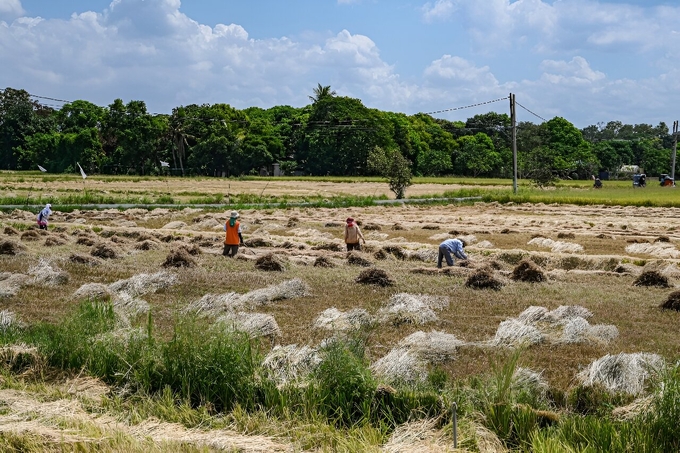November 19, 2025 | 09:42 GMT +7
November 19, 2025 | 09:42 GMT +7
Hotline: 0913.378.918
November 19, 2025 | 09:42 GMT +7
Hotline: 0913.378.918

Farmers work in a rice field in Bulacan in the Philippines.
The Philippines was the first country in the world to approve golden rice, which is enriched with the Vitamin A precursor beta-carotene and has a bright yellow color, in a bid to combat childhood blindness.
However, the Court of Appeals in Manila revoked a biosafety permit for commercial production of the rice granted by government regulators in 2021 after 14 opponents filed a challenge.
The court's ruling, issued on April 17 and seen by AFP on Thursday, also applies to a genetically modified eggplant, BT eggplant, that is pest resistant.
"By reason of the conflicting scientific views and uncertainties on the risks and effects of Golden Rice and Bt Eggplant, potential severe and grave threats to the welfare of people and the environment arise," the court said.
Commercial propagation was not allowed "until such time that the concerned respondent government agencies submit proof of safety and compliance with all legal requirements", it said.
Experts hope the rice will help combat childhood blindness and save lives in the developing world.
World Health Organization data show vitamin A deficiency causes up to 500,000 cases of childhood blindness every year, mostly in developing countries, with half of those dying within 12 months of losing their sight.
Golden rice was developed over two decades by the Philippines-based International Rice Research Institute (IRRI) and the Department of Agriculture-Philippine Rice Research Institute (PhilRice), while BT eggplant was developed by the University of the Philippines Los Banos campus.
The scientists involved insist both are safe to eat. PhilRice executive director John de Leon said in a statement the institute was "reviewing the implications" of the ruling to prepare its response.
The IRRI said it would continue to work with PhilRice on "developing safe and effective nutritional interventions through rice research".
It also said golden rice had received "positive food safety evaluations" from regulators in Australia, New Zealand, Canada, and the United States.
However, the rice faced strong resistance from environmental groups opposed to genetically altered food plants and at least one test field in the Philippines was attacked by activists.
The opponents who filed the objection, including Greenpeace, welcomed the ruling.
"This decision is a monumental win for Filipino farmers and Filipino people who have for decades stood up against genetically modified crops," Greenpeace Southeast Asia campaigner Wilhelmina Pelegrina said in a statement.
"GM crops have never been proven safe, and have hindered necessary progress on climate resilient ecological agriculture that keeps the control of seeds on our farmers."
Ordinary rice, a staple for hundreds of millions of people, particularly in Asia, produces beta-carotene in the plant but it is not found in the grain.
(AFP)

(VAN) Flagship partnership secures additional GBP 16.9 million to strengthen forest monitoring, transparency and country support to 2030.

(VAN) After a turbulent year for international development, the aid and assistance landscape has shifted, with donors rethinking how, where and why they support sustainable development.

(VAN) A new tool for measuring the economic value of farm animal welfare improvements has been developed, potentially transforming how consumers, retailers and the government evaluate animal welfare policies.

(VAN) The Amazon rainforest could face a renewed surge of deforestation as efforts grow to overturn a long-standing ban that has protected it.

(VAN) Conflict and violence are driving extreme hunger in six major crises.

(VAN) European Union member states are seeking to postpone the implementation of the bloc's anti-deforestation law by another year, an EU negotiating draft dated November 10 shows.

(VAN) Nearly 30 new avian influenza outbreaks have recently been reported in Germany, both on commercial poultry farms and in backyard flocks.